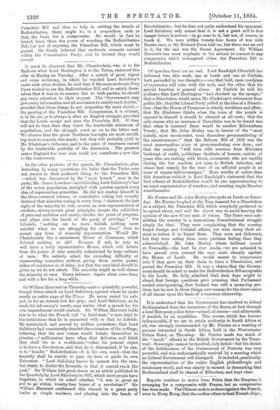Sir William Harcourt on Thursday made a splendidly powerful, though
bitter attack on Lord Salisbury, against whom he spoke nearly an entire page of the Times. He never varied his sub- ject, or for an instant lost his grip ; and Lord Salisbury, as he reads his adversary's words, may realise what a speech for his own impeachment would contain. Sir William Harcourt holds him to be what the French call "a fatal man," a man fatal to the institutions that he is connected with or that he defends. He maintained, and proved by endless quotations, that Lord Salisbury had consistently dreaded the extension of the suffrage, believing that the new ,.voters would betake themselves to plunder,—" millionaires have often that delusion, and think they shall die in a workhouse,"—that his present object is to force a Dissolution, and that he is determined, if he can, so to " handle " Redistribution—it is his own word—that the majority shall be unable to pass its laws or guide its own Executive. "Lord Salisbury knows he cannot win the race, but wants to doctor the favourite so that it cannot reach the post." Sir William laid great stress on an article published in the Quarterly by Lord Salisbury in 1867, which most people have forgotten, in which he asked whether "it was so great an evil to go within twenty-four hours of a revolution ?" Sir William Harcourt condeinned this remark in a great party leader as simple madness, and playing into the hands of
Revolutionists ; but he does not quite understand his opponent. Lord Salisbury only meant that it is not a great evil to face danger before it arrives,—to go near to it, but not, of course, to touch it. We were within twenty-four hours of war with Russia once, as Sir Richard Cross told us; but there was no evil in it, for the end was the Secret Agreement. Sir William Harcourt was most emphatic in his refusal to consent to any compromise which endangered either the Franchise Bill or Redistribution.


































 Previous page
Previous page